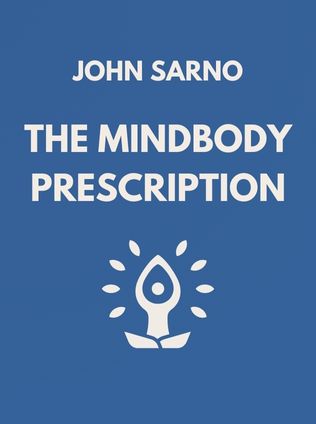
The Mindbody Prescription
Healing the Body, Healing the Pain
By John Sarno
Published 04/1998
About the Author
Dr. John Sarno was a pioneering physician in the field of rehabilitation medicine, particularly known for his controversial and groundbreaking work on the connection between the mind and chronic pain. Born in 1923, Sarno spent much of his career at the New York University School of Medicine, where he served as a professor and an attending physician at the university’s Department of Rehabilitation Medicine. His work centered on developing the theory of Tension Myositis Syndrome (TMS), a condition he argued was caused by repressed emotions, particularly rage, manifesting as physical pain.
Dr. Sarno authored several influential books on TMS, including "Mind Over Back Pain," "Healing Back Pain," "The Mindbody Prescription," and "The Divided Mind." Despite initial skepticism from the medical community, his ideas gained a significant following among patients who found relief in his methods, as well as among some medical professionals who began to see the potential in addressing the psychological components of chronic pain.
Sarno's work was both praised and criticized, with some lauding him for his innovative approach to chronic pain, while others dismissed his ideas as lacking scientific rigor. Nonetheless, his contributions to the understanding of the mind-body connection have left a lasting impact on the field of psychosomatic medicine.
Main Idea
"The Mindbody Prescription" explores the concept that many chronic pain conditions are not purely physical in origin but are instead the result of psychological factors, particularly repressed emotions. Dr. Sarno posits that the mind, in an effort to protect the conscious self from uncomfortable emotions, diverts attention to the body by creating pain. This condition, which he calls Tension Myositis Syndrome (TMS), can manifest as various physical ailments, such as back pain, neck pain, and other chronic conditions that often defy conventional medical explanation.
Sarno's central thesis is that by acknowledging and addressing these repressed emotions, patients can alleviate their chronic pain. He challenges the traditional medical model that separates the mind and body, advocating for a more holistic approach that considers the emotional and psychological factors contributing to physical health. Sarno's work encourages patients to understand the true source of their pain and to confront the underlying emotional issues, which he argues is the key to healing.
Table of Contents
- The Epidemic of Chronic Pain
- The Mindbody Connection: Understanding Tension Myositis Syndrome
- The Role of Repressed Emotions in Chronic Pain
- Personality Traits and Their Influence on TMS
- Recognizing and Treating TMS
- Practical Strategies for Overcoming TMS
- Living Pain-Free: Moving Beyond TMS
The Epidemic of Chronic Pain
Dr. Sarno begins by discussing the prevalence of chronic pain conditions in modern society, particularly those that seem to lack a clear physical cause. He notes that disorders like back pain, neck pain, and fibromyalgia have become alarmingly common, leading to an entire industry devoted to diagnosing and treating these conditions. However, despite the proliferation of treatments, many patients find little relief, leading Sarno to question the prevailing medical approach.
Sarno suggests that the reason for this epidemic lies not in the body but in the mind. He argues that chronic pain is often a manifestation of psychological stress, particularly repressed emotions. These emotions, when not acknowledged or expressed, are channeled into the body, creating physical symptoms that distract the individual from the underlying emotional turmoil.
Case Study: The Misdiagnosis of Chronic Pain
In his book, Sarno provides numerous examples of patients who had been diagnosed with various chronic conditions, such as herniated discs or arthritis, only to find that conventional treatments were ineffective. These patients often experienced significant relief after accepting a diagnosis of TMS and addressing their repressed emotions. Sarno’s findings challenge the common medical practice of attributing chronic pain to structural abnormalities in the body.
Sign up for FREE and get access to 1,400+ books summaries.
You May Also Like
The Subtle Art of Not Giving a F*ck
A Counterintuitive Approach to Living a Good Life
By Mark MansonRich Dad Poor Dad
What the Rich Teach Their Kids About Money - That the Poor and Middle Class Do Not!
By Robert T. KiyosakiHow To Win Friends and Influence People
The All-Time Classic Manual Of People Skills
By Dale CarnegieFreakonomics
A Rogue Economist Explores the Hidden Side of Everything
By Steven D. Levitt and Stephen J. Dubner



















